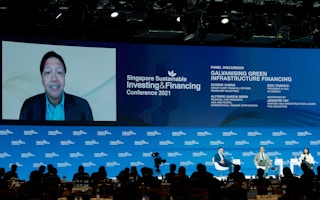The International Finance Corporation (IFC), the World Bank Group’s private-sector investment arm, and energy and urban development company, Sembcorp Industries, announced that the conglomerate had successfully launched a S$675 million (US$497 million) sustainability-linked bond (SLB) last Wednesday.
Sembcorp’s SLB is the first issuance by an energy company in Southeast Asia and the region’s largest such issuance to date. The bond was anchored by an investment of S$150 million from the IFC, the first investment of this kind from the corporation.
“These are the type of instruments that can really resonate well,” said Alfonso Garcia Mora, IFC’s regional vice president for Asia and Pacific, during a panel discussion at the Singapore Sustainable Investing & Financing Conference (SSIFC), an event co-organised by asset manager Blackrock, IFC and state investment firm Temasek as part of Ecosperity Week 2021, hosted by Temasek.
“They [SLBs] create the right incentives on the issuer’s side to do things that they have committed to with specific key performance indicators that are sustainable and incentives on the investor side, to make sure that they are not putting their money in something that will not comply,” Garcia Mora told the panel on Thursday.
Garcia Mora also said that the success of the bond issuance showed that investors have been clear about their position on the climate crisis and are continuing to shift capital to align their portfolios with net-zero targets.
Unlike traditional green bonds, SLBs involve issuers pledging to improve their performance against tailor-made environmental, social and governance (ESG) targets. They are increasingly being embraced as an alternative to traditional ESG debt.
Some of the projects that Sembcorp will be financing include wind and solar projects in India and China, Eugene Cheng, group chief financial officer of Sembcorp Industries told the panel, as well as a floating solar photovoltaic (PV) system on Tengeh Reservoir in Singapore.
“Corporate-based financing, such as using green bonds, or sustainability linked bonds, allow us to quite quickly deploy these funds. This financing gives a lot more flexibility and options in funding projects in these [emerging] markets,” Cheng said.
Sustainability-linked loans carry no restrictions on how the proceeds can be used, which makes them an attractive option for companies in a broad range of hard-to-abate sectors.
Net proceeds from the SLB will be used to finance Sembcorp’s general working capital requirements, refinancing its existing debt and financing, or refinancing its renewable energy or other sustainability projects.

L-R: Eric Francia, president & CEO, AC Energy attending virtually, Eugene Cheng, group financial officer, Sembcorp Industries, Alfonso Garcia Mora, regional vice president, Asia and Pacific, IFC. Jennifer Tay, partner and infrastructure leader, PwC Singapore moderated the panel at Ecosperity Week 2021.
The panel also discussed the merits of green bonds to help finance large capital projects in emerging markets. Philippine power company, AC Energy, has raised US$1.6 billion in green bonds since 2019.
The issuance has been “an opportunity to leverage this green bond framework to strengthen our ESG culture and elevate our standards,” Erica Francia, president and chief executive said during the discussion.
“Let’s not get too spoiled with this low interest rate environment,” Francia warned. “We do see some aggressive behaviour in the market on the back of low-cost capital, but for how long is that cost guaranteed for?” One strategy that the company has adopted to help mitigate this risk has been to incorporate green bonds that have various tenures.
Bankability and standardisation are likely to be the main barriers to emerging markets accessing capital. “The key thing is to make something that is bankable and replicable,” said Garcia Mora. Bankability will require identifying the policy reforms needed, such as public-private partnership frameworks that will resonate with institutional investors, Garcia Mora said.
“Clear rules of the game, clear standards…we need to provide that regulatory and policy security,” he said. “It is not just a question of creating a good project, it’s also a question of de-risking.”
Accelerating green financing will also take policy incentives such as taxes on more polluting sectors, said Garcia Mora.
The focus on energy transition, investing and financing is key, Cheng said, with many economies still reliant on ‘brown’ energy from fossil fuels. The SLB is part of the company’s plans to transform its portfolio from brown to green.
“There will be the need to look at ways in which we could release capital out of the brown side of things so that we can continue to drive growth on the green side of things.”
Sembcorp is looking to release capital to drive renewables growth and next-stage investments such as storage, and carbon capture.
The incorporation of energy storage is key to unlocking the potential of renewables, Francia said. “Governments and the private sector need to get energy storage to be optimised and effectively incorporated into the grid. And that’s when you will see the scaling up of renewables.”












